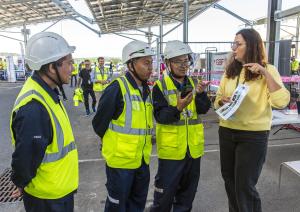From phone straps to neuroscience
The setting, the action, the small groups strolling from stand to stand ... it all felt like a village fair. Visitors could play ping-pong, maneuver toy forklifts, test their skills at various "games," have a taste of augmented reality and even take a ride 40 metres in the air in a bucket attached to a telescopic crane. But beyond the fun and occasional excitement, these activities and experiences had a very serious purpose: making staff and contractors aware of the importance of safety in each and every action, whether trivial and routine or exceptional and sophisticated.
The return of experience from the 2021 and 2022 editions greatly contributed to the themes and approaches of this year's ITER Safety Day on Thursday 14 September. "We realized that some safety aspects—such as psychosocial risks, managerial practices and the necessity to integrate safety constraints when designing a component or system—needed to be included, illustrated and explained," says Gilles Perrier, ITER Head of the Safety and Quality Department.
Now in its third edition (and the first fully post-COVID) the ITER Safety Day has become an important annual get together, where one can have direct interaction with top management. The event is breaking professional and hierarchical barriers because, precisely, we are all leaders when it comes to safety. Or, in Orlandi's words: "Safety is a collective effort. It knows no boundaries or job titles."
From the choice of a proper smartphone strap to the tricks the brain can play on the perception of reality, the ITER Safety Day explored a vast amount of territory, much larger than what one usually perceives as "safety." More than just an "event," Perrier insisted that it was "a call to action and a renewed commitment, knowing that our collective efforts will keep us safe and enable our organization to thrive."













